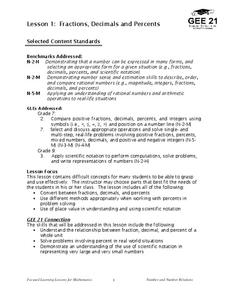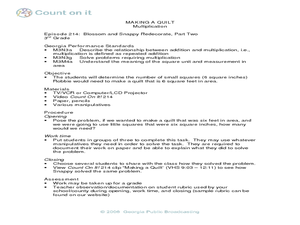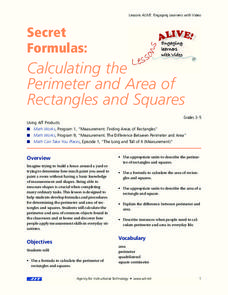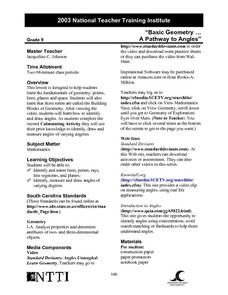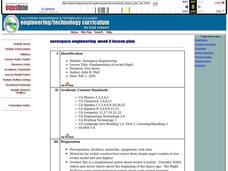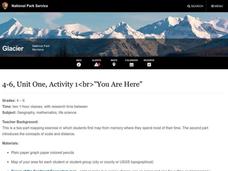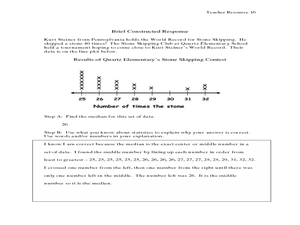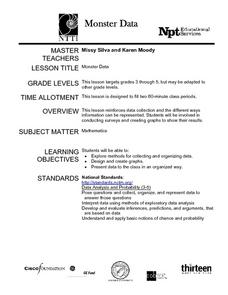Curated OER
Fractions, Decimals and Percents
Young scholars investigate the differences when using decimals, fractions, and percents. They focus on the process of using them in real problems and how to convert them from one form to another.
Curated OER
Making a Quilt: Multiplication
Third graders explore their multiplication skills. They will use their problem solving skills to solve an everyday math problem that requires them to multiply numbers. This lesson incorporates the use a video titled "Blossom and Snappy...
Curated OER
Candy Bar Math Fun!
Students practice math. In this measurement instructional activity, students measure their favorite candy bars to the nearest inch. They work independently to compare the different lengths of the candy bars they measure.
Curated OER
Secret Formulas
Learners calculate the perimeter of rectangles and squares. They imagine trying to build a fence around a yard or trying to determine how much paint they need to paint a room. They also develop formulas and procedures for determining the...
Curated OER
Just a Minute!
Students put the standard measure of clock time -- the minute -- in perspective. This lesson can be modified for virtually any grade level. They write about what they learned about a minute as a result of the activities.
Education World
Teaching Students to Tell Time: Three Resources for Busy Teachers
Elementary schoolers develop time-telling skills, one skill at a time. They examine the connection between time on digital and analog (clock-face) clocks. An excellent lesson plan on teaching how to tell time!
Utah Education Network (UEN)
Candies R Us
A box is fun to make, especially when it's a candy box! These activities help to cement understanding of the difference between surface area and volume. Have individuals measure the surface area of their box in two-dimensions before...
Curated OER
Tiling Tessellations
Young scholars explore tessellations. In this shapes and geometry lesson, students describe the attributes of many of the shapes displayed on an Elmo. Young scholars create examples of tessellations using pattern blocks.
Curated OER
Map Your School
Learners participate in a project to map their school. They measure and graph various areas around the school. Learners find the longitude and latitude of the school and research the school's history, and highlight special important areas.
Curated OER
What a Square
Students examine the painting "Old Man With A Gold Chain" by Rembrandt. They identify geometric shapes in the painting, measure these shapes and compare the relationships of these measurements.
Curated OER
Are You My Little Peanut?
Fourth graders explore the mass and length of peanuts by pretending to parent a peanut. In this mode, median and range lesson students graph their measurements and then use them to find the mode, median and range. Students discuss peanut...
Curated OER
Basic Geometry ... A Pathway to Angles
Help 9th graders identify lines, points, rays, and planes in geometry. They practice identifying, measuring, and drawing angles of different degrees. This is a fundamental lesson to help students learn the building blocks of geometry.
Curated OER
Visualizing Multiplication
Upper graders represent multiplication of a two-digit number by a two-digit number as the area of a rectangle with dimensions of the two factors. They find patterns for the number of different base ten blocks in a rectangle representing...
Discovery Education
Sonar & Echolocation
A well-designed, comprehensive, and attractive slide show supports direct instruction on how sonar and echolocation work. Contained within the slides are links to interactive websites and instructions for using apps on a mobile device to...
Curated OER
Aerospace Engineering
Twelfth graders examine the physics of rocket flight. They build and launch model rockets to measure their performances.
Curated OER
Scaling it Down: Caves Have Maps, Too
Measurement and map skills are the focus of this lesson, where learners crawl through a "cave" made out of boxes, desks and chairs, observing the dimensions. Your young geographers measure various aspects of the cave and practice math...
Curated OER
Understanding Proportions and Scale Drawings
Proportions are ratios found using multiplication or division. Middle schoolers solve measurement problems, find a figure's missing dimension, and find the distance between two points. Resource features four lesson plans with detailed...
Curated OER
You Are Here
Students map local places and learn to use scale and distance. In this mapping instructional activity, students map their school and a favorite place. Students recreate their maps showing distance and scale sizes. Students locate their...
Scientific American
Life-Sized Drawing
Ocean explorers or mathematicians research the wreck of the CSS H.L. Hunley. They investigate the actual dimensions of the Hunley using math and measuring skills. Afterward, they sketch a large scale drawing of the submarine outdoors on...
Curated OER
Super Shapes Part 2 - Circles
Through the use of Internet, video, and hands-on activities, youngsters learn the parts and characteristics of a circle. This fantastic lesson has some excellent website activities included in the plan. Your kids will have a much greater...
Curated OER
Chances Are
Upper graders examine the concept of probability. They collect data and create a bar graph. They must interpret the data as well. Everyone engages in hands-on games and activities which lead them to predict possible outcomes for a...
National Security Agency
Are You Ready to Call the Guinness Book of Records?
Learners design questions that can be answered by collecting data. In this line-plot lesson, pupils collect data and graph on a line plot on world records. An abundant supply of teacher support is provided in this resource.
Curated OER
Monster Data
An inventive lesson shows learners how to collect, organize, and present mathematical data. They access websites which lead them through a variety of ways to engage in data collection. They get to design and create graphs, and present...
Curated OER
A Tale of Two Stories
Students develop their classification and math skills using the stories "The Three Little Pigs" (Galdone 1970) and "Cinderella" (Grimm and Grimm 1981). They compare the two stories using venn diagrams, simple maps, and problem solving.


